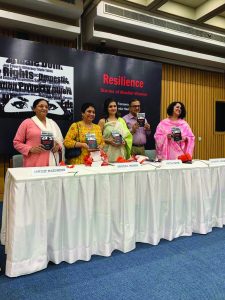 After reading this book by Shubha Menon, I would go ahead and say it’s a must read for any young or old woman from any given community in India, who is facing varying challenges and social constraints. Here, in this book, Shubha Menon, has focused on Muslim women living in a particular basti of New Delhi. And as the very title of this book suggests its their sheer resilience that makes them break free barriers…they break those shackles to stand strong on their own grit and self -confidence.
After reading this book by Shubha Menon, I would go ahead and say it’s a must read for any young or old woman from any given community in India, who is facing varying challenges and social constraints. Here, in this book, Shubha Menon, has focused on Muslim women living in a particular basti of New Delhi. And as the very title of this book suggests its their sheer resilience that makes them break free barriers…they break those shackles to stand strong on their own grit and self -confidence.
Well-written, it’s an effortless read…Shubha Menon takes the readers through the lanes and by lanes of Nizamuddin Basti , to introduce these gusty women from economically and socially disadvantaged backgrounds, who have not just survived but survived well enough to talk of their struggles. Today they have reached that level where they are no longer dependent on anyone.
But like any meaningful story, there’s that vital start. That all too crucial take off. That one prime motivator, who plays that crucial role to lead the way, to show the path ahead. To quote– “In the early 1980s, social activist Shabnam Hashmi came to Delhi from the erstwhile Soviet Union during her summer break from college. At the behest of a friend, she started teaching the Basti girls at a local adult education centre. But she soon realized that the centre didn’t want to go beyond the basic literacy. Shabnam found the girls had lot more potential, and decided to stay back.
And thus Seher Adult Education Centre came into existence…Seher, however started its journey on a bumpy road; coming from economically deprived families where even two square meals a day was a luxury at times, the girls had to struggle against severe hostility from the basti residents for whom Muslim girls going to study was anti-Islam…yet, the girls refused to give up, going not only to clear public examinations but also inspiring and motivating future generations.
These are stories of girls like Farida, who was made to wear a burqa at 9, married off at 13, abandoned with two children at 15, today runs an independent organization; Ayesha,not only fought for her own education but brought up her son to be an MBA and her daughter a Master in Science; Musarrat, whose grandmother kept her locked at home, now works for an international NGO…”
Yes, tucked in this book are stories of these women, who refused to give in to adverse circumstances. Surviving and battling, with grit and confidence.
letters@tehelka.com













